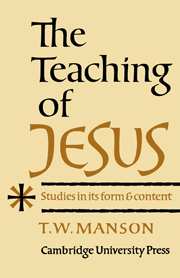Book contents
- Frontmatter
- Contents
- Preface
- LIST OF ABBREVIATIONS
- PART I PRELIMINARY QUESTIONS
- PART II THE CONTENTS OF THE TEACHING
- Chap. IV God as Father
- Chap. V God as King
- Chap. VI God as King: The Eternal Sovereignty
- Chap. VII God as King: The Kingdom in the World
- Detached Note C. The Terms ‘Disciple’ and ‘Apostle’
- Chap. VIII God as King: The Final Consummation
- Chap. IX Religion and Morals
- Detached Note D. On Mk x. 42–44
- Detached Note E. On Mk vii. 6–13
- Appendices I–VI
- Additional Notes
- General Index
- Reference Index
Detached Note C. The Terms ‘Disciple’ and ‘Apostle’
Published online by Cambridge University Press: 31 March 2010
- Frontmatter
- Contents
- Preface
- LIST OF ABBREVIATIONS
- PART I PRELIMINARY QUESTIONS
- PART II THE CONTENTS OF THE TEACHING
- Chap. IV God as Father
- Chap. V God as King
- Chap. VI God as King: The Eternal Sovereignty
- Chap. VII God as King: The Kingdom in the World
- Detached Note C. The Terms ‘Disciple’ and ‘Apostle’
- Chap. VIII God as King: The Final Consummation
- Chap. IX Religion and Morals
- Detached Note D. On Mk x. 42–44
- Detached Note E. On Mk vii. 6–13
- Appendices I–VI
- Additional Notes
- General Index
- Reference Index
Summary
The word ‘disciple‘ (μαθητής) is very common in the Synoptic Gospels in narrative. It is, however, curiously rare in utterances of Jesus himself. The only examples—out of more than 150—in the three Gospels are:
(a) Mk. xiv. 14. Jesus enquires for a place where he may eat the Passover with his disciples (parallels in Mt. xxvi. 18; Lk. xxii. 11).
(b) Q; Lk. vi. 40; Mt. x. 24 f.
The disciple is not above his teacher. … (Mt.; Lk.)
It is enough for the disciple that he become like his teacher. (Mt.)
But when perfectly trained he will be like his teacher. (Lk.)
(c) Q; Lk. xiv. 26 f. (Mt. x. 37 f.)
Lk. If anyone comes to me and does not hate his father and his mother and children and wife and brothers and sisters, and even his own life, he cannot be my disciple. Whoever does not carry his cross and come after me cannot be my disciple.
Mt. He who loves father or mother more than me is not worthy of me, and he who loves son or daughter more than me is not worthy of me, and he who does not take his cross and follow after me is not worthy of me.
[…]
- Type
- Chapter
- Information
- Teaching of Jesus , pp. 237 - 243Publisher: Cambridge University PressPrint publication year: 1935

